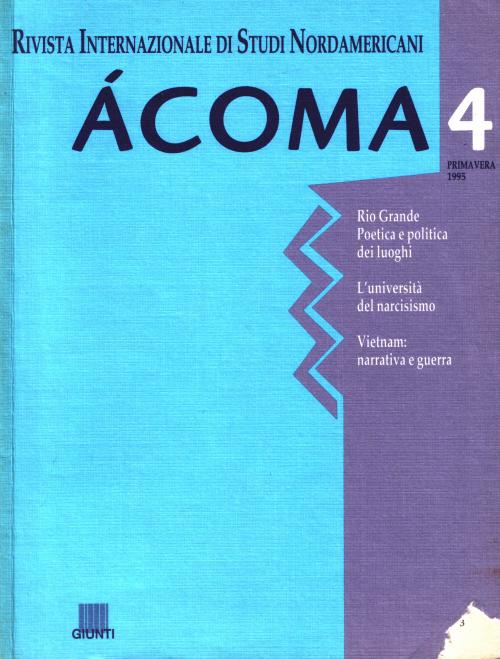Tu sei qui
Rio Grande
Numero 4
Primavera 1995 - Anno II
 Rio Grande: poetica e politica dei luoghi
Rio Grande: poetica e politica dei luoghi
 L'università del narcisismo
L'università del narcisismo
 Vietnam: narrativa e guerra
Vietnam: narrativa e guerra
Rio Grande
Steccati contro la libertà – pag. 4
Comunità, terra e resistenza in New Mexico nella seconda metà dell'Ottocento – pag. 14
The arrival in New Mexico of the Anglos after 1846 disrupted the old social and economic order. Exploiting the land laws of the United States, their almost exclusive knowledge of the English language, and the advantages deriving from their social position a small number of Anglo profiteers started the acquisitive process of “land grabbing”. The majority of the population of Mexican descent were rapidly turned into waged agricultural (and partially industrial) workers. In the Eighties and Nineties their resistance to expropriation found its channels of organized expression through the Knights of Labor, the underground Gorras Blancas, and Populism.
"Poco più che scimmie". Radici storiche degli stereotipi angloamericani sui messicani delle zone di frontiera – pag. 25
Scrivere le voci del Sudovest – pag. 34
Writing the Southwest is a radio program that tries to put into practice the idea that radio is an apt instrument for the dissemination of an oral literary tradition. The literatures of the Southwest can be presented effectively through radio-broadcasting of oral performances, thus overcoming the well-known difficulties of the written representation of the literary text. After offering a broad outline of the literary history of the Southwest, the essay goes on to illustrate the advantages and the challenges posed by this attempt to wed oral literature and radio, as well as the topics and authors discussed in the series.
L'orizzonte di Taos: la luce e l'arte di vedere – pag. 44
The author follows the paths of the members of the American avant-garde in their “search for light” in the early decades of the XX Century – from Cape Cod and Greenwich Village on the East Coast to the arid regions of New Mexico, namely Santa Fe and Taos. The attention is focused on Mabel Dodge Luhan, who moved from New York to Taos and was responsible for attracting there many artists and writers (D.H. Lawrence being the most notable among them), and on painter Georgia O’Keeffe, who elected the small village of Abiquiu as her residence. The individual fascination for light – and the desert, and the body... – is the running thread through the essay.
Lo Spirito del Luogo – pag. 56
The roots of the literary imagination are always to be found in a sense of place. Although the term ‘regionalism’ is usually employed in a negative sense, the ‘universal’ and the ‘local’ elements of a story are always interrelated. In a region like the Southwest – where, beginning with Native Americans, different ethnic communities have established their homes – literature will register a diversity of interactions between culture and land, as well as the constant crossing of the borders separating traditions, histories, and collective memories.
Intervista
Franco Moretti: L'università del narcisismo. Mercato, ricerca, specialismi nell'università e nella critica americana – pag. 61
Franco Moretti, Professor of Comparative Literature at Columbia University, discusses his experience as an Italian university professor and literary critic in the American academic world. He finds both strengths and weaknesses in the predominantly market-driven university system of the United States. Touching on such topics as multiculturalism, the rise of cultural studies and the New Historicism, the teaching of literature, the decline of the relationship between the university and the public sphere, Moretti traces a profile of American academia and American literary criticism, highlighting both their vitality and drawbacks.
Aggiornamenti
Narrativa statunitense e guerra del Vietnam: un canone in formazione – pag. 66
Saggi
Zora Neale Hurston: la mitologia e la storia – pag. 76
Despite its central place in the new “multicultural” literary canon, Hurston’s Their Eyes Were Watching God continues to be largely misunderstood, because it is approached from a predominantly historical perspective. The novel – contrary to critical commonplace – does not end happily with Janie’s rebirth, and her achievement of happiness and selfsufficiency. At the end Janie is a woman trapped between two equally unappealing alternatives: the alienating objectivity of bourgeois society, on the one hand, and the irrational subjectivity of nature and the proletariat, on the other. Although overall her views are politically and ideologically conservative, Hurston is critical of bourgeois culture and institutions, as well as of the ideologically and culturally subaltern position of the African-American bourgeoisie.
Le sceneggiatrici del muto americano – pag. 88
Contrary to what might be assumed, judging from later developments, female screen-writers were not only a majority in the Hollywood movie industry, but up to the middle of the Twenties they were ten times more numerous than their male colleagues. Muscio analyses this reality, both against the backdrop of the new trends in the American culture of the Twenties and against the XIX-century tradition of women as popular fiction writers. She also underlines the role that through the movies female writers had in spreading the image of the New Woman in American society.

